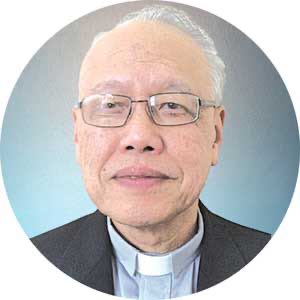God himself stands behind his creation. He stands behind everything.
In the Hebrew of Genesis 1, the name for God is Elohim. This is a plural word. God says in the plural, “Let us make man in our image, in our likeness” (Genesis 1:26a). Elohim is used as if it were singular to indicate that there is but one God only. The word “us” can mean any number over one. The use of the plural ending in the Hebrew text suggests that there are plural dimensions to God’s being.
Genesis 1: 26a may suggest the doctrine of the Trinity. The word “Trinity” means “tri-unity” or “three-in-oneness”. It was first used by Tertullian (c. 155-230). The doctrine of the Trinity is commonly expressed as “One God, three Persons”. It means that there is one God who eternally exists as three distinct Persons—the Father, Son, and Holy Spirit. God is one in essence and three in person.
God declares that he was alone when he created everything “by myself” (Isaiah 44:24). Yet Jesus was the instrument of God’s creation (John 1:1-3), in company of the Holy Spirit who was hovering over the primordial waters (Genesis 1:2b). Only the doctrine of the Trinity can explain it all. God exists as an eternal Trinity.
The Father, Son and Holy Spirit are distinct persons. The Bible speaks of the Father as God (Philippians 1:2), Jesus Christ as God (Titus 2:13), and the Holy Spirit as God (Acts 5:3-4). The Father is distinct from the Son because the Father sent the Son into the world (John 3:16). Later, the Father and the Son sent the Holy Spirit into the world (John 14:26; Acts 2:33). Thus, the Holy Spirit must be distinct from the Father and the Son. They are different persons, not three different ways of looking at God. Each person has a distinct centre of consciousness.
Each member of the Trinity is completely and fully God. Each person has the whole fullness of God’s being in himself (Wayne Grudem’s Systematic Theology, 1994, p. 252). The Trinity does not divide God into three parts. Each person is not “one-third” of God. Wayne Grudem writes, “When we speak of the Father, Son and Holy Spirit together we are not speaking of any greater being than when we speak of the Father alone, the Son alone, or the Holy Spirit alone” (Ibid. ). They are all identical in attributes. They are equal in power, love, mercy, justice, holiness, knowledge, and all other qualities. “No one Person has any attributes that are not possessed by the others” (Ibid. ). The distinction between the persons is not a difference in “being,” but a difference in “relationships”.
There is only one God (Deuteronomy 6:4-5; Isaiah 45:21-22; 44:6-8; Exodus 15:11; I Timothy 2:5). In Matthew 28:19, the Father, Son and Holy Spirit are distinguished as distinct persons. We baptize into the name of the Father and the Son and the Holy Spirit. Each person must be deity because they are all placed on the same level. We are baptized into their name, not names. The three persons are distinct, yet only constitute one name. This can only be if they share one essence.
The persons of the Trinity have different primary functions in relating to the world. Wayne Grudem writes, “In the work of redemption there are also distinct functions. God the Father planned redemption and sent His Son into the world. The Son accomplished redemption for us. After the Son ascended back into heaven, the Holy Spirit was sent by the Father and the Son to apply redemption to us. He empowers us for service” (Ibid. , p. 249). Alister E. McGrath writes, “every person of the Trinity is involved in every outward action of the Godhead” (Christian Theology, 2001, p. 326).
There are many differences in doctrine between today’s various mainstream Christian denominations, but the doctrine of the Trinity is not one of them. All true Christians believe in one triune God. Millard J. Erickson writes, “We do not hold the doctrine of the Trinity because it is self-evident or logically cogent. We hold it because God has revealed that this is what he is like. As someone has said of this doctrine: Try to explain it, and you’ll lose your mind; but try to deny it, and you’ll lose your soul” (Christian Theology, 1998, p. 367).
The doctrine of the Trinity is still unfathomable. We cannot fully understand the mystery of the Trinity. When someday we see God, we shall see him as he is, and understand him better than we do now. Yet even then we will not totally comprehend him.




